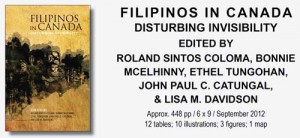Academia and Activism
Academia and Activism
By Ethel Tungohan
(Remarks delivered during the “Filipinos in Canada: Disturbing Invisibility” book launch on October 19, 2013.)
Are forming partnerships between academics and activists possible? Can these partnerships be used to further the field of Filipino-Canadian Studies? Forming these partnerships is obviously easier said than done. There is a lot of distrust on both sides. I consider myself both an academic and an activist, and I can understand why both sides are suspicious of each other.
For example, recently, an undergraduate student asked to meet with me to discuss his honors thesis, which he wanted to write on “migrant activism,” specifically focusing on Filipino migrant activism. When we corresponded, I was struck with how he made a lot of assumptions about migrant workers, culled no doubt from his reading of ‘classic’ texts on social movements and Marxist revolutions. He wanted to do interviews, which I fully supported, though I was doubtful whether he could successfully go in the ‘field’ as an undergraduate. Anyway, during our meeting, I was surprised when he asked me questions concerning the ‘trustworthiness’ of his “informants”, i.e., his interview ‘subjects’. “What do you mean,” I asked, puzzled. “Well,” he said, “when I was reading primers on how to do field work, one of the things we were warned against was how a lot of the people you interview lie because they have an agenda. So you have to try to catch them in their lies and see whether they’re telling the truth.” “Doesn’t everyone have an agenda?,” I asked in return. “What’s your agenda? What’s driving you to do this research?” He then admitted that while he was genuinely interested in the issues of migrant workers, he actually thought that writing his thesis on this topic will make him a more attractive candidate for law schools and graduate school programs.
While it is tempting to dismiss his stance as an anomaly, the fact is that such sentiments are pervasive within the ivory tower. Although a lot of research is motivated by genuine curiosity, what is left under-theorized are issues concerning the ethics of engagement between academics and community groups.
Because a lot of traditional research emphasizes ‘objectivity,’ what is lost is, well, one’s humanity. In other words, in seeing the social and political worlds as a laboratory with only one pathway to finding the ‘truth,’ it becomes easy to forget your ethical and moral obligations. Rather than seeing the people you are researching as people first, you only see them as potential sources of data.
On the other hand, my work with activists and community groups has shown me how these groups are understandably quite wary when it comes to engaging with academics. After all, why should activists and community groups trust academics when past experiences show them that academics aren’t really interested in ‘giving back’ to the community? Indeed, I’ve observed how in some cases, there is almost a tendency within some organizations to disavow research, to distrust research, to see research as being diametrically opposed to activism, and advocacy, and campaigning for change.
To bridge this gap, activists should not be afraid of the research process. Academics, in turn, should not to be afraid of being active and engaged politically. It is true that the academy is its own fraught space necessitating activist interventions. Heck, I would argue that the very existence of our book is one SUCH intervention. However, there are also battles to be fought outside the academy. I realized this in the course of doing my research on the migrant workers’ movement in Canada. When I started interviewing and working with different community and activist groups, I started becoming more aware of larger economic, political, and social struggles.
For example, I started seeing how much more needs to be done to ensure the just treatment of Filipino live-in caregivers. An eye-opening experience for me was attending a Town Hall on changes to the live-in caregiver program attended by community groups, representatives of employment agencies, employers, live-in caregivers and Members of Parliament running for office. In sitting there and hearing how a lot of these groups diminished the very real issues of family separation and employment rights facing live-in caregivers by saying things like, “well, family separation isn’t a big deal for Filipinos because they’re a ‘naturally’ nomadic culture,” I became painfully aware of how I cannot isolate myself as an academic. Though I’ve always been politically active, that was the start of my political reawakening and my involvement in migrants’ rights issues. That was when I became more active in seeking these partnerships between academics and activists.
The chapters in our book, “Filipinos in Canada: Disturbing Invisibility” is proof that partnerships between academics and activists can work, that these partnerships are actually integral to the creation of timely and relevant research and can actually help with advocacy pursuits. When looking at the chapters in this book once again, I was floored by how a lot of these chapters were written by contributors who worked in collaboration with community groups.
Marissa Largo, Geraldine Pratt, Conely de Leon, Maureen Mendoza, and Christine Balmes, for example, work closely with different community organizations and wrote chapters on topics as varied as colourism among Filipina youth and collaborative art as a tool for youth empowerment. Furthermore, some of our chapters, such as Philip Kelly, Mila Garcia, Ricky Esguerra and the Community Alliance for Social Justice’s piece on Filipino Immigrants in the Labour Market, serve as further proof that collaboration can work at all stages of the research process.
Thus, let’s debunk the false separation between ‘academia’ and ‘activism’ – both can exist together. Both should exist together. And, to reiterate, forming partnerships is one way of ensuring their co-existence.

Comments (0)